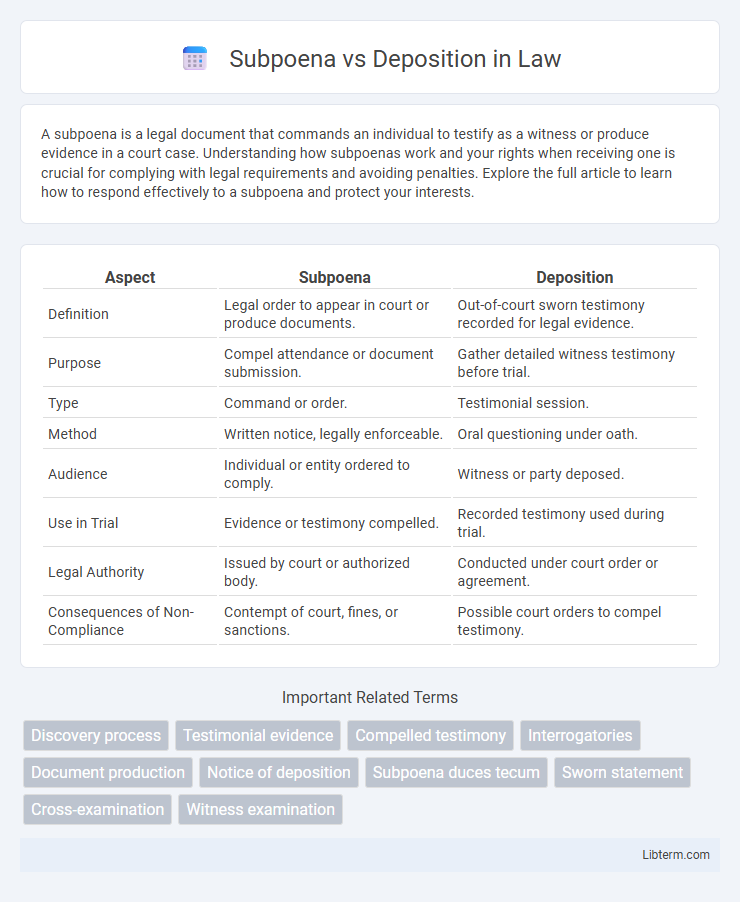A subpoena is a legal document that commands an individual to testify as a witness or produce evidence in a court case. Understanding how subpoenas work and your rights when receiving one is crucial for complying with legal requirements and avoiding penalties. Explore the full article to learn how to respond effectively to a subpoena and protect your interests.
Table of Comparison
| Aspect | Subpoena | Deposition |
|---|---|---|
| Definition | Legal order to appear in court or produce documents. | Out-of-court sworn testimony recorded for legal evidence. |
| Purpose | Compel attendance or document submission. | Gather detailed witness testimony before trial. |
| Type | Command or order. | Testimonial session. |
| Method | Written notice, legally enforceable. | Oral questioning under oath. |
| Audience | Individual or entity ordered to comply. | Witness or party deposed. |
| Use in Trial | Evidence or testimony compelled. | Recorded testimony used during trial. |
| Legal Authority | Issued by court or authorized body. | Conducted under court order or agreement. |
| Consequences of Non-Compliance | Contempt of court, fines, or sanctions. | Possible court orders to compel testimony. |
Understanding Subpoena: Definition and Purpose
A subpoena is a legal document compelling an individual to provide testimony or produce evidence in a legal proceeding. It serves the purpose of ensuring the presence of witnesses or the availability of crucial documents to support the case. Understanding the definition and purpose of a subpoena is essential for navigating pre-trial processes and enforcing compliance in litigation.
What Is a Deposition? An Overview
A deposition is a sworn, out-of-court testimony given by a witness or party involved in a legal case, recorded for later use in court proceedings. It allows attorneys to gather detailed information, assess witness credibility, and preserve testimonies before trial. Unlike a subpoena, which compels attendance or production of evidence, a deposition involves active questioning under oath, facilitating discovery in civil or criminal litigation.
Key Differences Between Subpoena and Deposition
A subpoena is a legal document that compels a witness to appear in court or produce evidence, while a deposition is a sworn out-of-court testimony recorded for later use in trial. Key differences include the purpose: subpoenas serve to summon individuals or documents, whereas depositions gather sworn testimony under oath. Subpoenas are often a prerequisite to depositions, which involve extensive questioning by attorneys to establish facts before trial.
Types of Subpoenas in Legal Proceedings
A subpoena in legal proceedings typically comes in two primary types: a subpoena ad testificandum, which compels a witness to appear and testify in court or at a deposition, and a subpoena duces tecum, which requires the production of documents, records, or evidence relevant to the case. Unlike depositions that involve sworn, out-of-court testimony recorded for trial, subpoenas serve as formal orders enforcing attendance or evidence disclosure. Understanding the specific type of subpoena is crucial for legal compliance and effective case preparation.
How the Deposition Process Works
A deposition involves a witness providing sworn testimony outside of court, typically recorded by a court reporter to capture every detail accurately. During the process, attorneys from both sides ask the witness questions to gather evidence, clarify facts, or assess credibility, with the witness under oath to ensure truthful responses. Depositions serve as a critical discovery tool, helping build cases and sometimes used to impeach witness testimony at trial.
Legal Rights and Obligations: Subpoena vs Deposition
A subpoena legally compels a person to appear in court or produce documents, establishing a clear obligation to comply under penalty of law. A deposition involves sworn testimony given outside court, requiring participants to answer questions truthfully under oath, preserving legal rights such as the Fifth Amendment protection against self-incrimination. Understanding the distinction between a subpoena's command to appear or produce evidence and a deposition's role in fact-finding helps clarify the scope of legal rights and obligations in pre-trial procedures.
Common Scenarios Requiring a Subpoena or Deposition
Subpoenas and depositions frequently arise in civil litigation, criminal investigations, and administrative hearings where obtaining evidence or witness testimony is crucial. Common scenarios requiring a subpoena include compelling the production of documents, records, or tangible evidence, while depositions are typically used to question witnesses or parties under oath before trial. Both tools ensure that relevant information is preserved and clarified, facilitating case preparation and resolution.
Preparing for a Deposition: What to Expect
Preparing for a deposition involves understanding that it is a sworn, out-of-court testimony used to gather information prior to trial. Witnesses should review relevant documents, anticipate opposing counsel's questions, and practice clear, concise answers to avoid misunderstandings. Being aware that a subpoena often requires appearance at a deposition helps ensure timely compliance and thorough preparation.
Consequences of Ignoring a Subpoena
Ignoring a subpoena can lead to severe legal consequences, including contempt of court charges, fines, and even arrest warrants. Failure to comply with a subpoena disrupts the judicial process and may result in the case being negatively affected or delayed. Courts strictly enforce subpoenas to ensure evidence and testimony are presented, making it crucial to respond promptly to avoid these penalties.
Subpoena and Deposition: Frequently Asked Questions
A subpoena is a legal document that compels an individual to testify or produce evidence, while a deposition is a sworn, out-of-court testimony recorded for later use in court. Subpoenas can require personal appearance or document production, and failing to comply may result in penalties. Depositions provide a detailed account of witness statements, often used to gather information and evaluate cases before trial.
Subpoena Infographic

 libterm.com
libterm.com